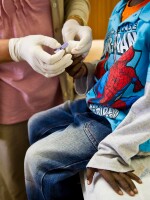
Richard Knox
Since he joined NPR in 2000, Knox has covered a broad range of issues and events in public health, medicine, and science. His reports can be heard on NPR's Morning Edition, All Things Considered, Weekend Edition, Talk of the Nation, and newscasts.
Among other things, Knox's NPR reports have examined the impact of HIV/AIDS in Africa, North America, and the Caribbean; anthrax terrorism; smallpox and other bioterrorism preparedness issues; the rising cost of medical care; early detection of lung cancer; community caregiving; music and the brain; and the SARS epidemic.
Before joining NPR, Knox covered medicine and health for The Boston Globe. His award-winning 1995 articles on medical errors are considered landmarks in the national movement to prevent medical mistakes. Knox is a graduate of the University of Illinois and Columbia University. He has held yearlong fellowships at Stanford and Harvard Universities, and is the author of a 1993 book on Germany's health care system.
He and his wife Jean, an editor, live in Boston. They have two daughters.
-
A new virus in the Middle East has sickened more than 180 people and killed an alarming 43 percent of them. But scientists haven't been sure where the virus originates or how people catch it.
-
When medical research is published in a peer-reviewed journal, the presumption is that the study has been reviewed for accuracy. The advent of open-access journals has made it easier to be published.
-
Heavy drinking can lead to alcohol-induced amnesia. It can be total or it can be spotty. Either way, it can be difficult for a bystander, or even the inebriated person, to know when it has happened.
-
The idea is to inject anti-HIV antibodies that would kill the virus when people get exposed. A new study is promising — although it was conducted on monkeys.
-
The demands: a U.N. apology for bringing the disease to the island, reparations for victims, repairs to the water system. Meanwhile, a study shows the toll is far worse than previously thought.
-
More than three-quarters of women who opt for double mastectomies are not getting any benefit because their risk of cancer developing in the healthy breast is no greater than in women without cancer.
-
Several times a week, Mike Quaglia dons bright red boxing gloves and pummels a hundred-pound punching bag. He has Parkinson's disease, and the boxing helps alleviate his symptoms.
-
Governments and nonprofits have insisted on keeping control of their projects in Haiti. So projects have cost several times more than they should. And Haiti is a long way from "building back better."
-
The risk of developing tuberculosis soars when someone has diabetes. The threat of a double pandemic is a challenge for the medical profession, where different docs typically treat each disease.
-
The diplomat violated a quarantine. The doctor became ill but still saw patients. Now Africa's most populous country is scrambling to find more than 200 people who could have Ebola.









